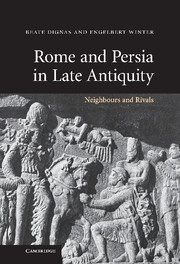Book contents
- Frontmatter
- Contents
- List of figures
- List of maps
- Preface
- Abbreviations
- Introduction: West and East, friend and foe, counterpart and mirror image …
- PART I NARRATIVE
- PART II SOURCES AND CONTEXTS
- Appendix 1 Lists of Sasanian kings and Roman emperors
- Appendix 2 Chronological table
- Appendix 3 Glossary
- Bibliography
- Index of sources
- Index of translated sources
- Index of names
- Index of place names
- General index
Appendix 3 - Glossary
Published online by Cambridge University Press: 05 June 2012
- Frontmatter
- Contents
- List of figures
- List of maps
- Preface
- Abbreviations
- Introduction: West and East, friend and foe, counterpart and mirror image …
- PART I NARRATIVE
- PART II SOURCES AND CONTEXTS
- Appendix 1 Lists of Sasanian kings and Roman emperors
- Appendix 2 Chronological table
- Appendix 3 Glossary
- Bibliography
- Index of sources
- Index of translated sources
- Index of names
- Index of place names
- General index
Summary
amicitia
The Latin term amicitia describes various personal or political aspects of friendship, i.e. it is used in the context of relations between individuals as well as states. Outside Rome amicitia can point to a treaty or to friendly relations between two states that existed without an official foedus. Amicitia required bilateral consent. In general, the declaration of amicitia was motivated by the desire for a reconciliation of interests.
breviarium
Breviaria were short histories written in a continuous narrative, in contrast to a ‘chronicle’, which was in general a list-type record of events and dates in chronological order. Breviaria intended to both entertain and teach. They primarily served to provide uneducated new elites with a necessary historical and cultural knowledge. This genre became particularly popular during the fourth century ad.
catafractarii
This was the mailed cavalry that the Romans faced for the first time in 190 bc when they fought the Seleucid king Antiochus III. The catafractarii contributed significantly to Crassus' defeat at Carrhae against the Parthians in 53 bc. The impact of this unit was also responsible for the military strength of the Sasanians in the third and fourth centuries ad. The catafractarii were armed with a heavy lance and attacked their enemies' lines frontally in a single body.
Christological controversies
After Constantine the Great had become a supporter of Christianity deep theological confrontations emerged within the Roman Empire. During the time of bishop Alexander I of Alexandria (312–28) the main dispute was over Arianism. According to Arius, a cleric from Antioch, Christ was not truly divine.
- Type
- Chapter
- Information
- Rome and Persia in Late AntiquityNeighbours and Rivals, pp. 273 - 281Publisher: Cambridge University PressPrint publication year: 2007



